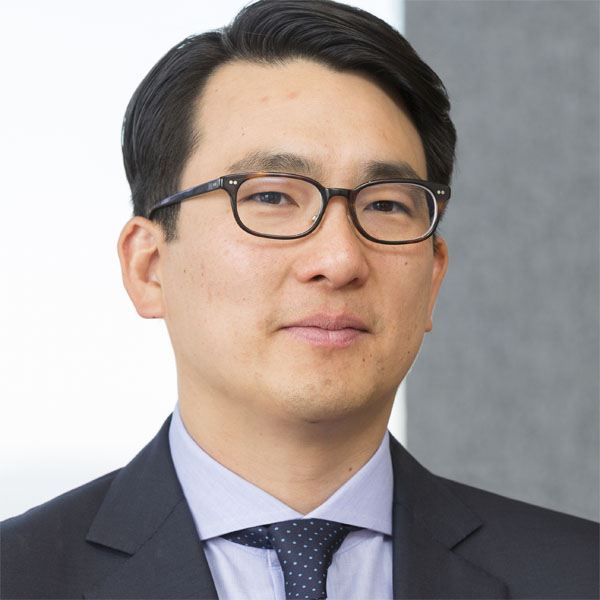Biotechnology
Christopher Lee is a Capital Group equity analyst who follows U.S. pharmaceuticals and biotechnology. He holds a medical degree from Columbia University and a bachelor’s degree in molecular biophysics and biochemistry from Yale. We asked Christopher about investing long-term in a volatile sector, “third wave” innovations and areas of opportunity.
What’s your core approach to investing?
At its heart, my approach is about identifying the most scientifically and commercially groundbreaking innovations. I look for therapies that address significant unmet needs — diseases without effective and safe treatments that also have the potential to translate that need into meaningful revenues. Ultimately, drug companies are product companies, just like any other industry. There are some important differences, but companies need to make products that doctors and patients want to use. One important difference is that drugs take years to develop and face massive technical, regulatory and commercial hurdles. As such, I think a lot about where a company is in its lifecycle of product development. That cycle plays a big role in how we assess risk and opportunity.
Biotech can be volatile, but Capital Group is a long-term investor. How do you reconcile those two dynamics?
I think the drug industry, and healthcare in general, is a fertile ground for extremes. There’s quite a bit of volatility in the stocks, so firms with much shorter time horizons, ones that are trading-oriented, are drawn to health care because of that volatility. But the most compelling value, in my view, is accrued by those who can hold through the noise to benefit from the long-term compounding that these companies can enjoy and generate for their shareholders. A long-term view is one of our biggest advantages. It lets us see past the market’s short-term inefficiencies and focus on the fundamentals — important new scientific breakthroughs, changes in the regulatory environment, reimbursement dynamics — that drive long-term value creation. This is also a highly technical sector, and developing relationships with companies, other stakeholders in the ecosystem, scientists in academia and others over a long period of time also offers a competitive advantage.
When there’s a moment of volatility with one of your holdings, what kind of questions are you asking yourself?
One of the keys is to accurately assess how much the new news that’s driving the volatility impacts the longer-term thesis. If news breaks that a clinical trial failed, I want to understand if it’s a fundamental blow to the development of the drug or just a short-term setback. Investors can draw premature conclusions in the short term that can lead to missing the longer-term potential. That’s another area where we often differentiate ourselves.
You’ve said before that we’re beginning the “third wave” of biopharma innovation. What is that?
The first wave was small-molecule drugs — traditional pills born out of chemical synthesis. The second was biologics — protein-based therapies like monoclonal antibodies, which added a new level of complexity and efficacy. The third wave is genetic medicine — an entirely new toolkit that allows us to intervene at the level of DNA and RNA. Gene therapies, cell therapies and RNA-targeting drugs are already here, and they’re unlocking the possibility of treating or curing conditions that were previously untreatable. We’re still in the early stages, but the level of precision and potential impact is transformative.
Did the weight-loss drug boom or the COVID pandemic change how you think about the sector?
COVID was a reminder of how hard it is to make decisions under conditions of uncertainty. If you had taken a step back and looked at the history of epidemics or pandemics, you would see that they spike and then they decrease. In hindsight, pandemic-related disruptions, though intense, were temporary. But it didn’t feel like it would be that way in the moment. I was fielding just as many questions from colleagues about personal health as I was making investment decisions. It showed how biotech can become central to people’s lives.
The weight-loss drugs were interesting for the opposite reason. The data was impressive from the start, but investors were slow to accept it. The consumer actually led the market. Anecdotally, people taking GLP-1s were reporting not just weight loss, but changes in consumption beyond just food and changes in quality of life. That gap between lived experience and market narrative was striking. One of the fun parts of this job has been to analyze things that are not only moving the markets but having an impact on people’s daily lives.
How are policy or regulatory shifts shaping your views on U.S. biotech today?
For as long as I’ve covered this industry, there have been regulatory changes in the U.S. and abroad that’ve been constant headwinds for the industry. Right now, the key things that people are discussing are the impact of tariffs, and the idea that the U.S. pays too much for its drugs relative to the rest of the world, which is a debate that’s been going on for decades. This introduces uncertainty, for sure, but the industry has proven remarkably resilient. History tells us that it should continue to innovate and create new drugs that people need. I’m not complacent, but I’m also not alarmist. Even if the pricing environment tightens, companies that deliver genuine clinical value tend to do well.
Related insights
-
-
Economic Indicators
-

 Christopher Lee
Christopher Lee